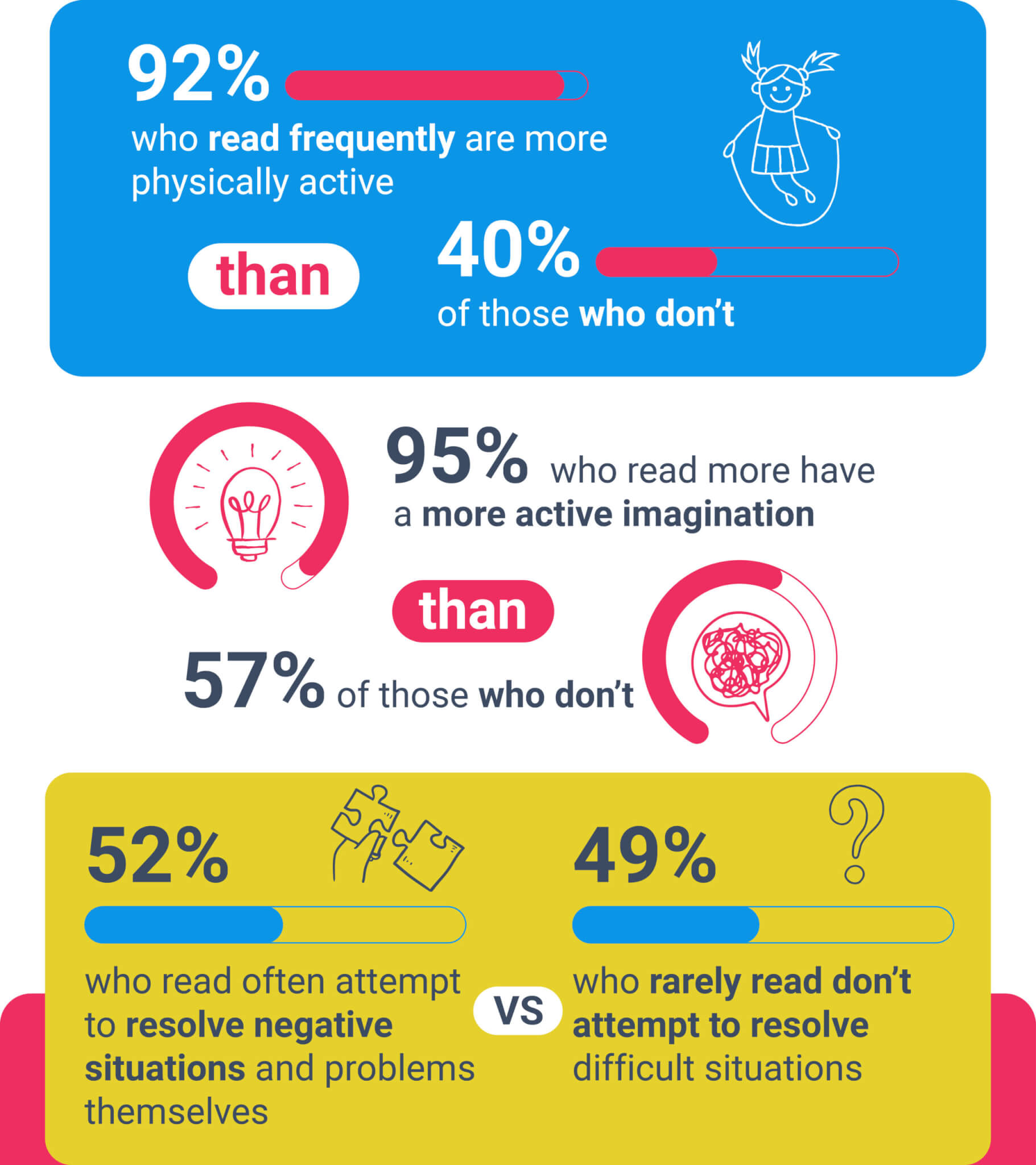This was important to actually measure. Modernity demands that a child learns to walk and to talk and then to read. Of course, almost all do learn to read, if only to use their cell phones.
Back in the day education took you to grade six, which meant been able to read. After that skill was developed as always by just reading a lot. Those comic books did the job as well.
Fact is even then, not reading was a rarety as it was just too useful.
Reading is Fundamental: Children Who Love Books are Happier, More Physically Active
AUGUST 25, 2023
https://www.activistpost.com/2023/08/reading-is-fundamental-children-who-love-books-are-happier-more-physically-active.html
Does your kid read a lot? A new study suggests they’re likely happier, more physically active, have a more active imagination, and even problem-solve better than kids who rarely or never read.
The poll of 1,500 American parents and 500 K–6 teachers revealed that 91 percent of children between five and 12 years-old who are avid readers are also happier than those who don’t (36%). Likewise, 92 percent who read frequently are more physically active than those who don’t (40%).
Kids who read “often” and “very often” generally have a more active imagination than those who rarely or never read (95%, compared to 57%).
Children who read more also take a more proactive approach to resolving negative situations and problems. While 49 percent who rarely read don’t attempt to resolve difficult situations, 52 percent who read often try to resolve the situation themselves, and 69 percent who read very often turn to their parents for help.
Commissioned by the digital reading platform Epic and conducted by OnePoll, the study uncovered the average child reads five books per month, both inside and outside of school, and 54 percent read a new book at least weekly.
Reading was found to profoundly impact what children want to do with their lives, too. Over half of parents surveyed (55%) said their children like to pretend-play based on what they read.
A large majority of parents (85%) agreed reading can unlock their children’s potential later on in life, and 61 percent believe their kids would read more if they didn’t have to physically go to a bookstore or library to get books.
Three in five parents said their kids have shared what they want to be when they grow up, including being a doctor or nurse (23%), teacher (16%), or scientist (15%). For over a quarter of kids (27%), their professional aspirations were inspired by the books they read or listened to.
“The role books play in a child’s life is practically immeasurable,” says co-founder at Epic, Kevin Donahue, in a statement. “It’s so much more than a way to learn about the world around us. For children, it’s a world all on its own — full of inspiration that can show kids what lies in store for them in the future as adults.”
The survey, which also polled 500 teachers, revealed further insights into a child’s reading habits inside school. Over half (56%) confirmed that the kids in their class collectively have a “favorite” book they flock to, with the most popular genres being adventure books (41%), picture books (38%), fantasy books (36%), and comics/graphic novels (36%).
On average, students spend 35 minutes reading throughout the school day outside of textbooks. Still, 40 percent of teachers don’t feel like their students spend enough time reading during a typical school day.
To encourage reading outside of school, teachers shared their favorite methods of motivation: encouraging them to visit their local library (66%), rewarding them with in-class points (60%), and encouraging them to use digital reading platforms (49%).
Over three-quarters (77%) use digital reading as a way to encourage reluctant readers to read more, and 53 percent believe digital reading has helped students catch up after pandemic-era learning loss.
“What’s truly encouraging is how reading has evolved beyond just a physical book,” continues Donahue. “We live in a digital age, and we’re able to take the contents of physical bookshelves and put them in the hands of a child.”
“For so many kids, the motivation to read more simply comes from access — giving them the access they need will cause them to read more, learn more, and be inspired to do more.”
Survey methodology:
This random double-opt-in survey of 1,500 American parents of children aged 5 – 12 and 500 American teachers of grades K – 6 was commissioned by Epic between July 20 and July 27, 2023. It was conducted by market research company OnePoll, whose team members are members of the Market Research Society and have corporate membership to the American Association for Public Opinion Research (AAPOR) and the European Society for Opinion and Marketing Research (ESOMAR).


No comments:
Post a Comment